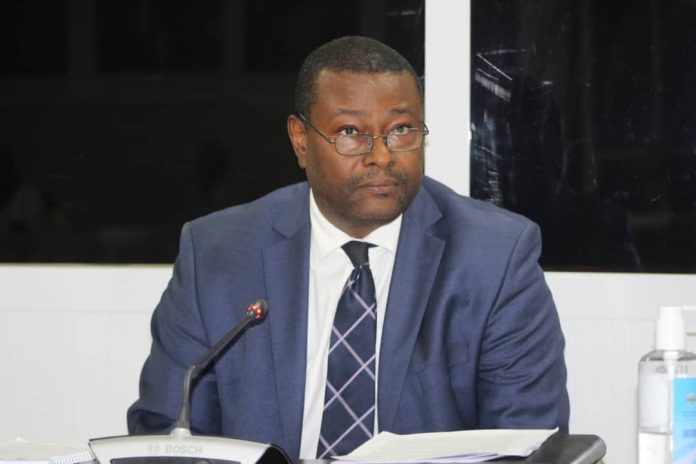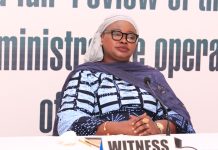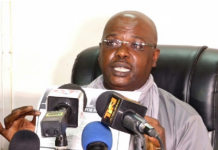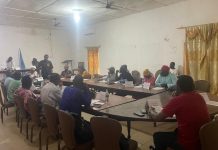By Momodou Jarju
The chairperson of the National Human Rights Commission (NHRC) Emmanuel Daniel Joof has detailed The Gambia Government’s long silence over attempts to repeal the ban on Female Genital Mutilation (FGM) when the matter was first brought to fore before the national assembly.
His remarks were in response to Hon. Gibbi Mballow’s question on why it took so long for the commission to call out the human rights violations the pro-FGM bill posed. Mballow also asserted that there was a culture of silence in the executive.
The veteran lawyer agreed with Mballow that there was a complete silence from the executive, saying they were supposed to say something because it is a national law that was being contravened.
“But just to tell you that as soon as the talk was on about the possibility, just the possibility of having this bill, on the 12th of September, 2023, the first press statement, and I’ll just explain to you, ‘Attempt by some National Assembly members to repeal the laws which criminalises FGM in The Gambia’. This was our first press [release], it was all over. We were concerned.
“We will give you all these documents. Just to tell you that we were the institution that never shied away from [the matter]. And it was all over the world, this press statement. I’m just talking about September. Now, on 27th February this year, we came up with another very strong statement, ‘Grave concern about attempts to repeal the Women’s Amendment Act’. Again, it went all over the world,” he told the lawmakers.
But they didn’t stop at the press statement. Commissioner Joof said his-led team visited the gender ministry to talk to them about the matter.
He added: “We are the advisor of Government on Human Rights. We told them we were very concerned. We’ve not had them make any statement. I went there with the full team. They told us, well, they are working so hard. I’m talking about September. That was the first visit.”
The NHRC boss said the ministry should have come out and talked to the people because saying nothing wouldn’t help the situation.
“I reminded her because she was in Geneva in October last year when Gambia was reviewed under the CEDAW (The Convention on the Elimination of All Forms of Discrimination against Women). And again, FGM came. And the person who gave our minister a lot of trouble, I will tell you, was a committee member from Saudi Arabia, a female medical doctor, who told her, you know, why are you people not being serious with your act? So we had a frank discussion with the minister,” he said.
Joof said the minister assured them that the bill will never be tabled, while informing them that she was doing her quiet diplomacy due to the sensitivity of the issue which was why she wasn’t making a lot of noise. At the time, he went on, that was maybe understandable.
“When we left there, honorable, the next day we went to the minister of justice; me and my commissioners and team. When we went to the minister of justice, we saw the minister and the solicitor general. And our concern was, one, honorable minister, we saw you wrote something about supporting women’s rights. But this is a law. We’re not even campaigning for it. The law exists. And if you have people inciting others to break the law… you should come out with a strong statement, at least to say, as far as the government is concerned, there is a law that has criminalised this act. You are quiet. Why are you quiet?” he said.
“So again, we’re given assurance, but what the minister said was, listen, this is a docket under the minister of gender. We will support them, but let them come with a strong statement. We’ll be together with them. But we were not convinced. We said, but you are the chief legal government advisor. So we left.”
Joof said they will package all the information and give it to the joint committee. Speaking further, he said they then started engaging the civil society groups about the issue.
“Now, when the matter was tabled, we wrote to all the political party heads that have representation in this national assembly. The speaker was copied. It’s in the records somewhere here (i.e. National Assembly). We wrote and said, again, we are concerned. We have raised this issue and we explained. And we tell all that tell your party leaders, this law should not be repealed, X, Y, and Z. And of course, none of them actually responded. That said, we had made efforts during that period to talk to them. And most of the time, the information we got was, well, this is a sensitive issue. It will probably die down. It will go to committee stage,” he said, adding that they even made a delegation to the Vice President as well.
“So just to allay your fears…we have been at the forefront of this and we will continue. But just to tell you that definitely, we are the only institution that never kept quiet on this issue and we have evidence to back it. In our position paper, we’ll also put these things for you, so that you can just see. We’ve been doing campaigns to even tell the government they had forgotten about this provision that you’ll be asked to answer.”




















